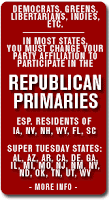Political blogger switches party affiliation and restores the GOP to pre-Bloomberg defection levels.
http://westanddivided.blogspot.com/2...hes-party.html
On Monday last, there were 69,548,864 voting age Americans affiliated with the Republican Party. On Tuesday, there were only 69,548,863 as New York mayor Michael Bloomberg ended his six year membership in the GOP saying "... good ideas should take precedence over rigid adherence to any particular political ideology." The GOP can ill afford any defections. They have enough problems with this Republican President hell bent on alienating every single voter in the country and this Republican Vice-President working to sever all legal ties to the government and the constitution. Enough is enough. I mean, it is not even fun beating this dead elephant any more. This is just not healthy.
Today I announce that I am switching my party affiliation from Democratic to Republican.
With this announcement the Republican party is restored to the pre-Bloomberg defection level of 69,548,864.
I am completely serious. Although I have been a registered Democrat for 20 years, I will be registering as a Republican in time for the  2008 primary in California. Why? I am simply acting on the lessons learned from Michael Bloomberg. He changes his party affiliation about as often as I change my underwear, and probably for similar reasons (comfort, style, personal hygiene, dirty laundry needing an airing out, whatever). He was a Democrat until it was more convenient for him to run for New York mayor as a Republican in 2001. Now being a Republican is chafing against his political ambitions and personal convictions. Time for Mike to drop those drawers. Bloomberg is right. Party affiliation really should only be worn under the cover of practical political clothing and the stylish ideological overcoats we show to the world.
2008 primary in California. Why? I am simply acting on the lessons learned from Michael Bloomberg. He changes his party affiliation about as often as I change my underwear, and probably for similar reasons (comfort, style, personal hygiene, dirty laundry needing an airing out, whatever). He was a Democrat until it was more convenient for him to run for New York mayor as a Republican in 2001. Now being a Republican is chafing against his political ambitions and personal convictions. Time for Mike to drop those drawers. Bloomberg is right. Party affiliation really should only be worn under the cover of practical political clothing and the stylish ideological overcoats we show to the world.
Party affiliation is always secondary to, and in the service of accomplishing political objectives. Bloomberg's objective in changing his underparty support may be an independent run for the office of the President of the United States. My objective in changing my underparty is to secure better government in Washington DC.
If, you believe as I do, that federal government should be limited, careful, fiscally responsible, with individual rights respected, oversight of our elected representatives effective, and laws enacted only after being tempered by the fire of partisan debate, then you also may want to consider the merits of changing your
representatives effective, and laws enacted only after being tempered by the fire of partisan debate, then you also may want to consider the merits of changing your underwear party affiliation frequently. These objectives can be accomplished at the ballot box. Not by voting exclusively Republican, Democratic or 3rd party, but by voting consistently for divided government. That these objectives can be accomplished by following this path is documented historical fact. The most recent example is playing out before our eyes as a result of the 2006 election. Wearing a Bloomberg independent 3rd party “hairshirt” presidential bid may or may not serve to accomplish these objectives. Working for these objectives in a worn pair of cotton “divided government” boxers is a much more comfortable way to go.
Here is the rub. The Democrats will not lose the House or Senate in 2008. There are 33 Senate seats contested in 2008. Of these, 21 are held by Republicans and 12 by Democrats. Simple numbers lead to a simple conclusion - the Republicans have more at risk, and the Democrats have many more opportunities to take seats than Republicans. This is a crushing structural advantage for Democrats. The Senate is out of reach, but what about the House? The House of Representatives has never changed majorities in the 100 years since we have been directly electing Senators, unless the Senate also changed majorities. The conclusion is clear. In 2009 we'll again have a Democratic House and Senate. The benefits of divided government can only be maintained by electing a Republican or independent 3rd party President in 2008. I have nothing against third parties, but tilting at windmills is not my thing. But, hey - don't let that stop you. If that is your preferred path, knock yourself out. If you get something going that might win, I just may change affiliations again. In the meantime I'll be working to make sure that we continue our happily divided government, by supporting the best Republican candidates to win the nomination.
John Farmer at the New Jersey Star Ledger distills the problem and opportunity nicely in his op-ed "Americans are better off junking party loyalty":"We're witnessing the dawning of the Age of Agnosticism in American politics. It's long overdue. Until recently, our major parties, Democrat and Republican, enjoyed a presumption that they represented not only the best in modern political thinking but also the interests of individual Americans and the nation. It's been hogwash for some time.... The Libertarian Party believes many Democrats and Republicans have, at last, spotted the scam. In a press release this week, the Libs gleefully reported a sharp decline in Republican and Democratic party membership, a rise in Libertarian enrollment and success at the polls. The Libs are on to something -- especially when New York City Mayor Michael Bloomberg's defection from the GOP and new standing as an "unaffiliated" voter are cranked into the mix. But probably not as much as they think. The rise of a credible third party, which presumably is where all this is heading, is just not in the cards. The hurdle is not the popular vote. It's the Electoral College, with votes in most states awarded on a winner-take-all basis. That favors established parties. Teddy Roosevelt, the most successful Third Party candidate, won better than one in four votes in 1912 but carried only six states. Teddy's principal impact was to drain votes from the GOP president, the favorite, and elect the underdog Democrat, Woodrow Wilson, which is undoubtedly the effect a third-party effort would have in 2008. So what are we left with? Agnosticism. It's not a bad alternative. For it says to both parties, "We'll no longer take you on faith. Prove yourself."
Well said, John, but I have one nit to pick. The parties may never be able to "prove themselves." On the other hand, the benefits of divided government are already proven. We can continue those benefits, if enough of us are politically agnostic.
Tactically this is it how it can play out: Ron Paul and Chuck Hagel are my top Republican presidential hopefuls. I'd have added Bloomberg to that list if he had stayed with the GOP. Hagel remains undeclared, but is clearly a stronger national candidate than either Paul or Bloomberg. Interestingly, while sitting on the sidelines, he may find the path for a Republican run cleared by the surprising support garnered by Ron Paul, and the foundation for an Independent run built by the Bloomberg announcement. Unity08 is building the infrastructure and raising funds for a "Unity ticket", but requires the ticket to be a mix of Republican, Democratic, and/or Independent candidates. Bloomberg's quick-change artistry opens the door for a Hagel/Bloomberg Unity08 ticket. By waiting to declare, Chuck may have some pretty good choices.
My first choice is to save the GOP. To do that, real conservatives and libertarians need to take back the Republican party from the Bushists. Michael Nystrom and Verbatim at the Daily Paul are promoting the right idea with this call to action "Change Party Affiliation to Republican to Participate in Primaries": 
"As you may realize, there are many people from across the spectrum planning to support Ron Paul: Libertarians, Constitutionalists, Green Party members, disenfranchised Democrats, and of course the disenfranchised Republicans. Many of these people may not realize that they NEED to change party affiliations to Republican to vote in the GOP Primary in many States. I think this information is important to get out as is instructions on how to change ones' party affiliation and the DEADLINE for each State."
This is an effort I can get behind. It is worth noting, that should the Paul candidacy falter, the base of enthusiastic Ron Paul supporters are a natural constituency for a Chuck Hagel run. In support of their efforts, I'll be posting the Daily Paul "Call to Action" badge in the sidebar of this blog, and encourage any other bloggers interested in saving the GOP to do the same.
The only way to avoid single party Democratic control of the Federal government in 2009 is to fix the GOP. We cannot fix the GOP if we are not in the GOP. Now is the time for all good independents, moderates, and libertarians to reach out and come to the aid of the Republican party. They need our help and they need our membership - whether they want it or not.




 Reply With Quote
Reply With Quote Democrats are more dispirited today than they have been in years. It's not just that President Bush's approval ratings continue to defy gravity, or that he's been largely successful in enacting a conservative agenda. Nor is it simply that Democrats seem to lack a fighting spirit and an effective message. It's not even the distinct possibility that Republicans could retake the Senate this fall, and with it, control of Washington. What's plaguing so many in the Democratic Party is that looking to the future, there doesn't appear to be a savior. Presidential aspirants are already lining up for 2004, but so far, no one's very excited.
Democrats are more dispirited today than they have been in years. It's not just that President Bush's approval ratings continue to defy gravity, or that he's been largely successful in enacting a conservative agenda. Nor is it simply that Democrats seem to lack a fighting spirit and an effective message. It's not even the distinct possibility that Republicans could retake the Senate this fall, and with it, control of Washington. What's plaguing so many in the Democratic Party is that looking to the future, there doesn't appear to be a savior. Presidential aspirants are already lining up for 2004, but so far, no one's very excited.



Bookmarks